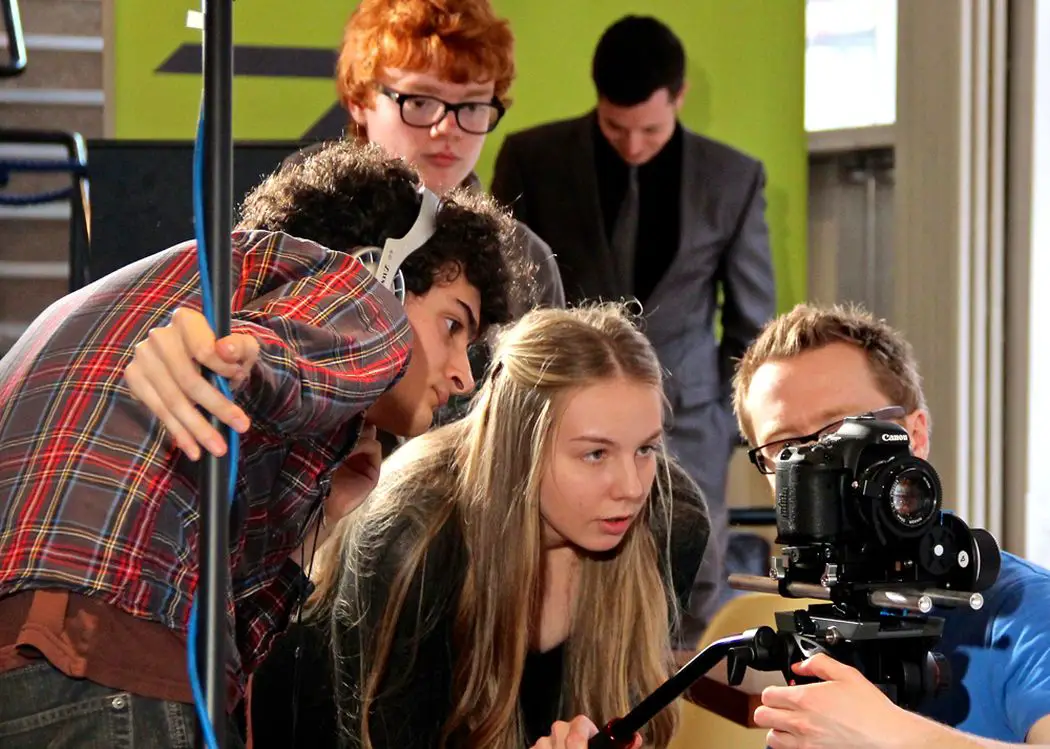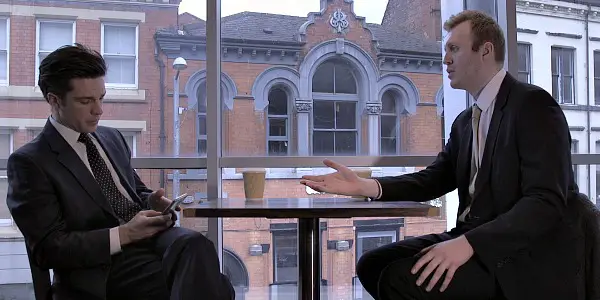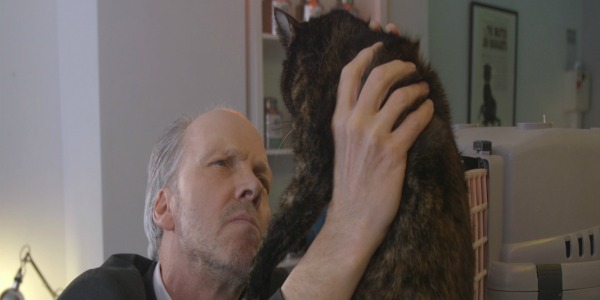BFI Film Academy Programme: 3 Short Films By Young Up-And-Coming Filmmakers In The UK

I'm a copywriter with a passion for film and screenwriting.…
With so much talk about the lack of equality and accessibility in the mainstream film industry, it was heartening to get a glimpse into what’s happening at the other end of the spectrum – the new talent with the potential to be the next generation of award-winning writers, directors, producers, cinematographers and editors.
That glimpse was a special screening I went along to recently at Broadway Cinema in Nottingham – showcasing three wonderful shorts made by 18 young people on the British Film Institute’s, or BFI Film Academy programme.
Short But Sweet
For starters, the programme, which is open to young people aged 16-19, only costs £25, and this fee can be waived by applying for a bursary, so there’s no financial barriers to getting involved. Secondly, 11 of the 18 young people on this year’s Nottingham programme were young women, and they led the way when it came to writing, directing, and editing. It’s safe to say, all 18 wrote, directed, produced, filmed and edited their hearts out – and their passion and dedication really showed.
Through the programme, the young people get to learn practical filmmaking and develop an understand of film theory, the film industry and the production of short films – with 124 hours of intensive film-making activity. All the films were made using industry-standard equipment and feature local professional actors.
The three shorts – Cheapskate, Baby and Tuna on Wednesdays – are due to hit the UK festival circuit this summer, before being made available for public viewing online. However you get to see them, you’re in for a treat.
Wonderfully inventive and uniquely different, each film manages to conjure up characters and stories with real depth; hinting at lives and events that leave you wondering and wanting more. Not bad for five minutes apiece. Or a bunch of young filmmakers, the majority of who haven’t done anything like this before.
All 18 participants came up with an idea for a short and the winning scripts were chosen by a panel of professionals, including a representative from the BFI. I can imagine it was a tough job to choose just three, but it’s easy to see why Cheapskate, Baby and Tuna on Wednesdays stood out.
Cheapskate
Cheapskate is an impressively different take on an enduring issue for the UK – homelessness. Refreshingly, the film moves away from the usual ‘us and them’ format, to focus on a guy who could be any one of us. When we first meet Frank he’s getting out of a car in a nice neighbourhood, he’s wearing a suit, it looks as if he’s meeting a colleague. Surely he can’t be in the same predicament as the homeless man who asks him for money as he waits outside a coffee shop?
It’s easy to warm to Frank – there’s a sense of vulnerability about him, a sense that something isn’t right and he’s in trouble. Even though he doesn’t have any money to give the homeless man, he checks his wallet, he doesn’t just ignore him. Despite his brash ex-colleague, Joe, accusing him of being a cheapskate when Frank angles for him to pay for their coffees, we know he’s not just a cheapskate, we know there’s more to it than that.

After all, only a desperate man would bother having coffee with someone as thoroughly unlikeable as Joe – loud, arrogant, deeply unsympathetic, perhaps even a bully in Frank’s former work life. Needless to say, Frank’s wasting his time and Joe isn’t going to give him a job or any work, he won’t even buy him a drink. After ordering his own suitably pretentious option, he simply calls Frank a cheapskate and strides off to his seat, leaving Frank to awkwardly ask for a cheap black coffee and ashamedly pocket the few coins in change that Joe hasn’t bothered to pick up.
A new take on homelessness
Joe’s wilful blindless when it comes to Frank’s obvious predicament is a well-observed reflection of society’s all-too-frequent treatment of homelessness. The idea that it’s something that happens to other people, that it’s something of their own making, that it doesn’t happen to ‘regular’ people like Frank, professional people with careers, suits, cars, families.
Joe skips over Frank’s telltale hesitancy when he asks him about his wife and kids – he’s not listening, he’s already thinking about his next meeting, with the arrogant assurance of a man who’s ‘made it’. It’s pretty clear what Frank’s hesitancy means though – things clearly aren’t going well at home.
On his way back to his car, Frank gives the coins he pocketed to a homeless man – a truly touching gesture when everything points to Frank being in need of them himself. As it turns out, Frank’s car – parked in a wealthy, well-to-do neighbourhood – is also his home.
Picture perfect editing
In a final sequence, beautifully edited, we see Frank taking off his suit, the outwardly visible symbol of success and money being stripped away, to finally reveal, Frank – the homeless man, living out of car, his few meagre possessions including a sleeping bag in the back.
The scene, unfolding in a series of cleverly edited shots, adds to the sense of Frank’s rapidly unravelling decline, from the once-successful professional and family man implied, to the hapless homeless guy reduced to living alone in his car. It ends with Frank closing the boot door of his respectable-looking estate car, the hidden homeless man, once again hidden from the world.
Untold stories
The script was co-written by Faye Russell and Rory Tasker, and it shows a remarkable level of maturity – permeating the mind of a man in his mid-thirties who’s fallen on hard times (apparently through no fault of his own), and the growing issue of ‘hidden homelessness’ in the UK, where more and more people are forced to ‘sofa surf’, or in Frank’s case, live in his car.
I liked how Frank’s story was subtly told, through expressions and gestures and the things left unsaid. For example, Frank never says his relationship with his wife has broken up, we just know from his awkward response. I also liked how the filmmakers juxtaposed two versions of homelessness to tell a wider story – the stereotypical homeless guy out on the freezing cold street; versus Frank, the ‘hidden homeless’, one step away from the freezing cold street, save for his car, yet still willing to give the homeless man his last few coins.
It’s a clever way to make a compelling point – that any one of us, however successful, however rich, however ‘socially acceptable’ aren’t all that far away from homelessness, or the homeless people we may walk past on the street; all it takes is a series of unfortunate events.
Cast: Frank: Alex Walsh, Joe: Ben Redgate, Homeless man: Andy Batson
Writers: Faye Russell & Rory Tasker, Director: Faye Russell, Producer and Assistant Director: Charlotte Southwell, DOP: Rory Tasker, Camera Assistant: Evan Connell, Production Designer and Editor: Millan Hart.
Baby
When you’re new to filmmaking and you’re making a short on a small budget, sci-fi is a brave genre to choose. The team behind Baby pull it off admirably, thanks to a wildly inventive script by Caitlin Bott and a great understanding of the elements that make up the genre.
Fast-forward into an unnervingly glossy era where the sheen of everything around you hints at something far darker and corporately dystopian, and the film tells the story of a couple, Aspen and Max, ‘shopping’ for their dream child. Bott’s script was inspired by the idea of ‘Build A Bear’ – and the logical conclusion that in the future, we’ll simply visit a shop to ‘Build A Baby’.

In style, Baby has echoes of the cult 1960s sci-fi classic Barbarella (1968), while in feel, it reminded me of the original The Stepford Wives (1975), with a perfect façade hiding the sinister truth just beneath the surface. That uneasiness gave the film a real edge, all the more tangible because it’s unspoken.
Angel wings and mermaid tails
On the surface, all is perfect – from the saleswoman talking the couple through their options, to the dizzying array of choices to create your own dream child. We’re not just talking choosing eye or hair colour, in Baby’s starkly sterile world you can choose everything from lilac skin to angel wings or a mermaid tail. You can also choose from 200 different sexes!
As with Cheapskate, the young filmmakers make good use of characters to explore the issues. Baby’s ultra-corporate saleswoman, Rowanda, with her whiter-than-white smile and maniacal laugh (made more scary by a couple of extreme close-ups) represents all that’s wrong with the idea that reproduction has become a purely consumerist activity.
In contrast, lilac-skinned mother-to-be Aspen just wants a ‘natural’ baby – no special colours, features or add-ons, just a regular human like her husband Max. However, Max doesn’t understand her reticence when there’s so much to choose from and wants a lilac-skinned baby, ‘beautiful’ and ‘different’ just like his wife.
In the end, the saleswoman has the perfect solution and a deal not to be missed, with the ending implying that the couple plump for a ‘two-for-one’ option to keep them both happy.
Predicting the future
With shades of X-Men (2000), Baby hints at the idea that despite babies coming in a myriad of colours and forms, prejudice is still alive and well, with regular humans being the ‘natural order’ of things, and coloured skin – including lilac – still representing the ‘exotic’ and ‘other’.
It may only be five minutes long, but Baby conjures up an intriguing vision of the future, where like Sonmi’s world in Cloud Atlas (2012), the future is a heightened yet logical extension of the now – a place where consumerism has permeated into every facet of humanity. The fact Baby focuses on something as primal and intrinsically human as reproduction makes it unsettlingly compelling, yet hugely entertaining at the same time.
At the Q&A after the screening, one of Baby’s young filmmakers joked that all it takes to make a good sci-fi is some good sci-fi style music. The music certainly helped, but many aspects go towards making Baby a successful sci-fi, including a strong, creative premise and great sets, lighting, costumes and make up.
Cast: Aspen: Chloe Martin, Max: AJ Stevenson, Rowanda: Tori Hope
Writer: Caitlin Bott, Director: Ada Player, Producer: Nina Kordula, Assistant Director & Camera Assistant: Ryan Gallagher, DOP: Fynn Lithgow, Production Designers: Caitlin Bott and Ada Player, Sound: Katie Sowter, Lighting and Editing: Fynn Lithgow.
Tuna on Wednesdays
All three scripts show a maturity beyond the young filmmakers’ years, but it’s most evident in Tuna on Wednesdays, written by Imogen Oribine-Milne. The film tells the story of George, a grumpy, intransigent man in his twilight years, impatiently cynical about the world around him, yet hugely likeable because we can see his closed-offedness is just a defence against the unsaid things life has thrown at him over the years.

George has come into his local – for his usual drink and rail against the world, bending the ear of the sympathetic bartender. This time however, George is accompanied by a cat and he’s clearly not happy about it. He’s got no time for the young woman who dares to get in his way when he’s walking through the door. He’s livid that his recently departed life-long friend Artie has had the temerity to leave him his cat…when he knew he doesn’t like cats…instead of something more suitable – like a pocket watch.
There’s a brilliantly funny moment in the film when after George’s tirade against Artie’s choice of parting gift, the bartender asks George the cat’s name, which turns out to be…Lucky. Humour is what makes Tuna on Wednesdays so entertaining, effortlessly evoking empathy and even pathos, without ever being sentimental or overly dramatic. Instead, it captures the wonderful emotion of the everyday, the mundane, the ordinary. We all know a George, we all feel like George at some time or another.
Grief, loss and companionship
Left alone when the bartender goes off, George finally decides to say hello to Lucky. He opens the door to the pet carrier and lifts Lucky out – and the two meet eye-to-eye, a look of mutual familiarity passing between them. After all, they’re both in the same boat. They’ve both lost Artie and are both in need of companionship.
Inside the pet carrier, George finds a suitably no-holds-barred note from Artie, telling him life’s too short to be a miserable git and he left him Lucky as the ‘only living creature that would put up with him’. It’s funny, but it’s also a moving tribute to a true friendship played out over many years, heightened by a collection of photos Artie’s left with the note. The letter ends by telling George that Lucky likes tuna on Wednesdays…
From a cat’s point of view…
The team behind the film did well to ignore the old adage about never working with animals. The moment of connection between George and Lucky really works and there’s some brilliant shots of George filmed from Lucky’s perspective, from behind the bars of his pet carrier.
George still barges past the young man coming in the door as he leaves the bar, but this time, it’s because he’s on a mission – for tuna.
It may only be a short, but Tuna on Wednesdays captures the grief and loneliness of being left behind perfectly, moving, but never maudlin.
Cast: George: Phil Smeeton, Bartender: Mark Jarvis, Dead Artie (photos): Roger Knott-Fayle, Lucky: Pepper
Writer & Camera Assistant: Imogen Oribine-Milne, Director: Joe Tutt, Producer & Lighting: Kirsty Macadam, Assistant Director: Maggie Bielecka, DOP: Sabina Szczerzba, Sound & Editing: Emily Lovett, Production Design: the team.
In conclusion
Broadway is hoping to run its sixth BFI Film Academy programme later in 2017 – and if the shorts it produces are anything like the fifth outing, I’m looking forward to the results already.
By making entry-level filmmaking so accessible, the programme attracts a much more representative range of young people, and all the life experiences and untapped creativity that goes with that. It was especially heartening to see so many young women involved too, taking the lead on all three films.
Several of the young people are already working on their next film projects, some of them in collaboration, so there’s a good chance the names I’ve listed above could be appearing on a screen near you in the not too distant future…
Has a short been your introduction to someone who’s gone on to become your favourite filmmaker?
Find out more about the BFI Film Academy
Cheapskate, Baby and Tuna on Wednesdays will be released for public viewing online after featuring in a variety of festivals over the summer.
Watch this space for more and to see other shorts made by Broadway’s filmmakers.
Does content like this matter to you?
Become a Member and support film journalism. Unlock access to all of Film Inquiry`s great articles. Join a community of like-minded readers who are passionate about cinema - get access to our private members Network, give back to independent filmmakers, and more.
I'm a copywriter with a passion for film and screenwriting. I love most film genres but especially thrillers, science fiction, movies based on classic literature and films that can't be pigeon-holed.













